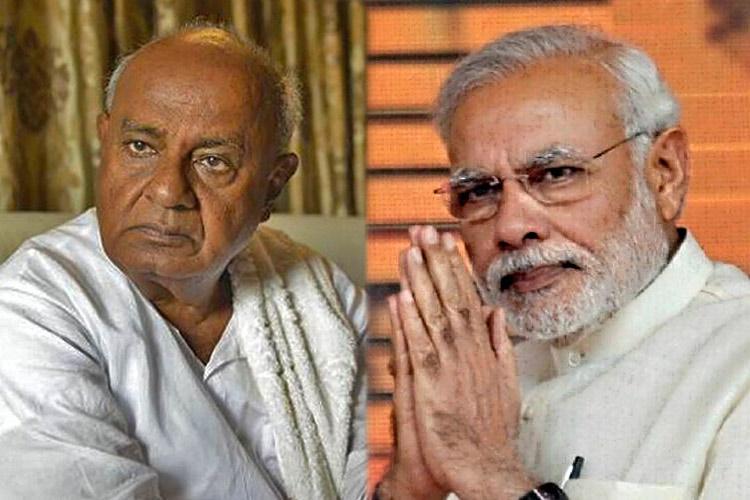
PM Modi on Tuesday inaugurated the 4.9 km long bridge at Bogibeel across Brahmaputra river.
BENGALURU: While the inauguration of the Bogibeel Bridge by Prime Minister Narendra Modi in Assam on Tuesday was welcomed by many, it reportedly brought disappointment for former Prime Minister and JD (S) supremo HD Deve Gowda, who had laid the foundation stone of the longest rail-cum-road bridge, over not being invited to the event.
Though the PM inaugurated the 4.9 km long bridge at Bogibeel across Brahmaputra river, built at a cost of Rs 5,900 crore, its foundation stone was laid by Gowda when he was the prime minister in 1997.
“Railway line to Kashmir, Delhi Metro and Bogibeel rail-road bridgewere among the projects I had sanctioned (as prime minister). I had sanctioned the budget of Rs 100 crore for each of these projects and laid their foundation stones. People have forgotten today,” Gowda said.
Replying to a question from reporters on the sidelines of a function in Bengaluru as to how he felt about the inauguration of the project started by him, the former prime minister said he had given the nod for many projects.
To a question whether he received an invitation, Gowda quipped, “Aiyo Rama! Who will remember me? Some newspapers might have mentioned about it.”
On the enormous delay in completing the project, he said, “That is where I differ. I completed the Hassan-Mysuru project in 13 months. I completed two bridges on time. Anagwadi bridge (across Ghataprabha). Go and see the bridge on Krishna river.
“Some people from Bombay Karnataka region say that Deve Gowda did not do anything (for the north Karnataka region), go and see it,” he added.
Amid much fanfare, the Prime Minister on Tuesday inaugurated the country’s longest rail-cum-road bridge over the Brahmaputra river at Bogibeel near Dibrugarh in Assam.
The PM, who reached Dibrugarh in the afternoon from New Delhi, flew directly to Bogibeel in a chopper and dedicated the 4.94-km-long double-decker bridge to the nation from the south bank of the river.
After greeting people, standing on the foothold of his vehicle, PM Modi deboarded the car and walked a few metres on the bridge along with Assam Governor Jagdish Mukhi and Chief Minister Sarbananda Sonowal.
The PM crossed the bridge in his cavalcade to the north bank of Brahmaputra, where he flagged off the Tinsukia-Naharlagun Intercity Express.
The train will run five days a week.
The 4.9-km bridge will cut down the train-travel time between Tinsukia in Assam to Naharlagun town of Arunachal Pradesh by more than 10 hours.
The strategically important bridge, which begins at Dibrugarh and ends at Dhemaji districts of Assam, will remove communication bottlenecks to several districts of Arunachal Pradesh.
The Bogibeel Bridge, which was a part of the Assam Accord and sanctioned in 1997-98, is also likely to play a crucial role in defence movement along the India-China border in Arunachal Pradesh.
The foundation stone of the project was laid by former prime minister H D Deve Gowda on January 22, 1997, while work commenced on April 21, 2002, under the Atal Bihari Vajpayee-led government. The Congress-led UPA government had declared it a national project in 2007.
December 25 happens to be Vajpayee’s birth anniversary.
Due to an inordinate delay in its implementation, the cost of the project escalated by 85 per cent to Rs 5,960 crore from the sanctioned estimated cost of Rs 3,230.02 crore. The total length of the bridge was also revised to 4.94 km from the earlier 4.31 km.
The bridge is part of the infrastructure projects planned by India to improve logistics along the border in Arunachal Pradesh.
“The bridge will enhance the national security of the eastern region by facilitating the swift movement of defence forces and their equipment. It was constructed in such a way that even a fighter jet can land on it in case of emergency,” a source said.
A senior army official had earlier said the biggest advantage of the bridge will be an easy movement of troops from southern to northern bank.
“This means travelling to the farthest most point of India’s border with China will be shortened by several hundred kilometers,” he had said.
Northeast Frontier Railway (NFR) Chief Public Relations Officer Pranav Jyoti Sharma had also said that the bridge will provide logistical support for the Indian Army manning the border.
The road distance from Dibrugarh to Itanagar will be reduced by 150 km and the railway travel distance between these two points will shorten by 705 km, he had said.
The bridge and the train will be a boon for the people of Dhemaji as major hospitals, medical colleges and airport are in Dibrugarh, the third-largest city in the Northeast.



